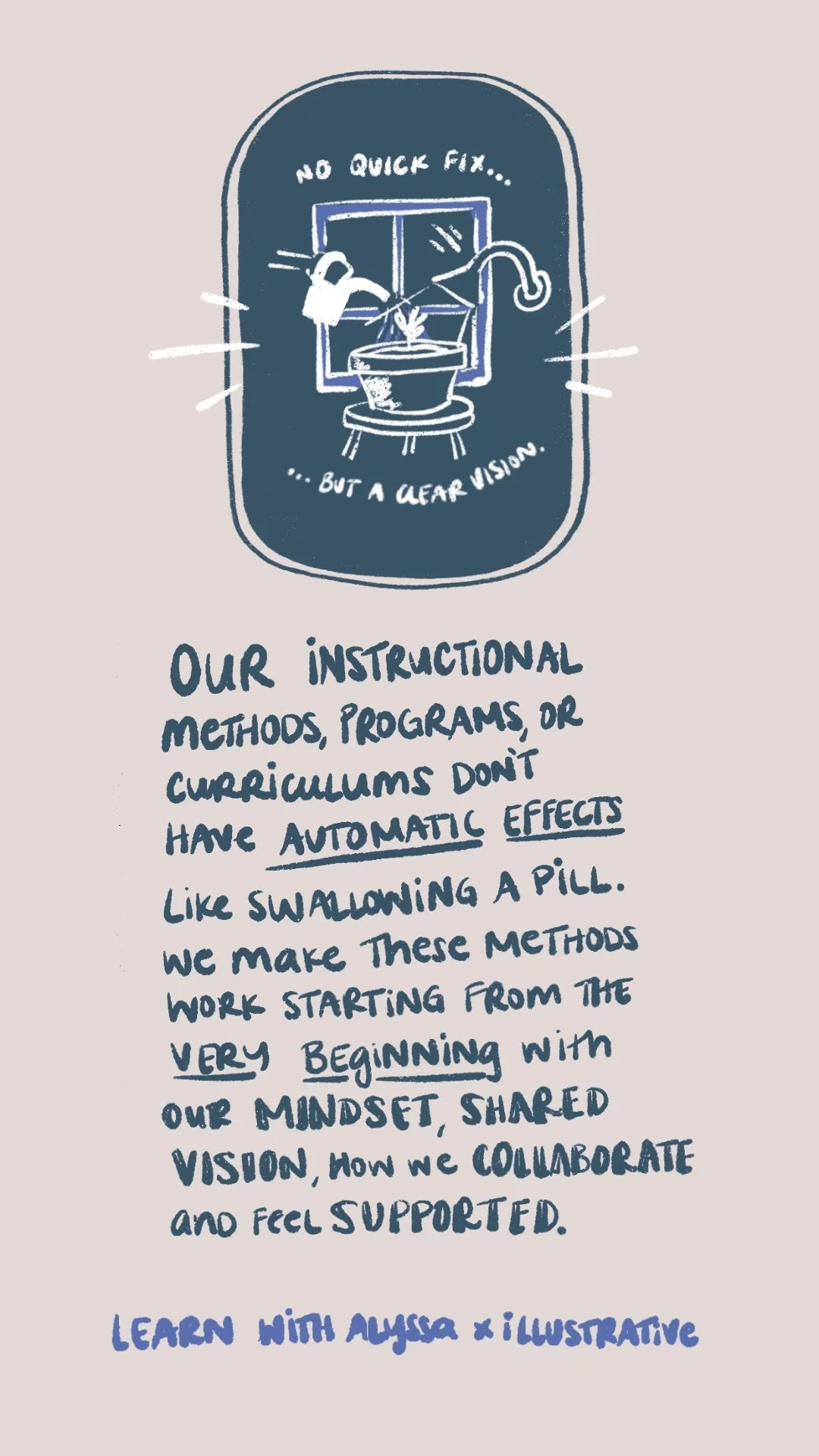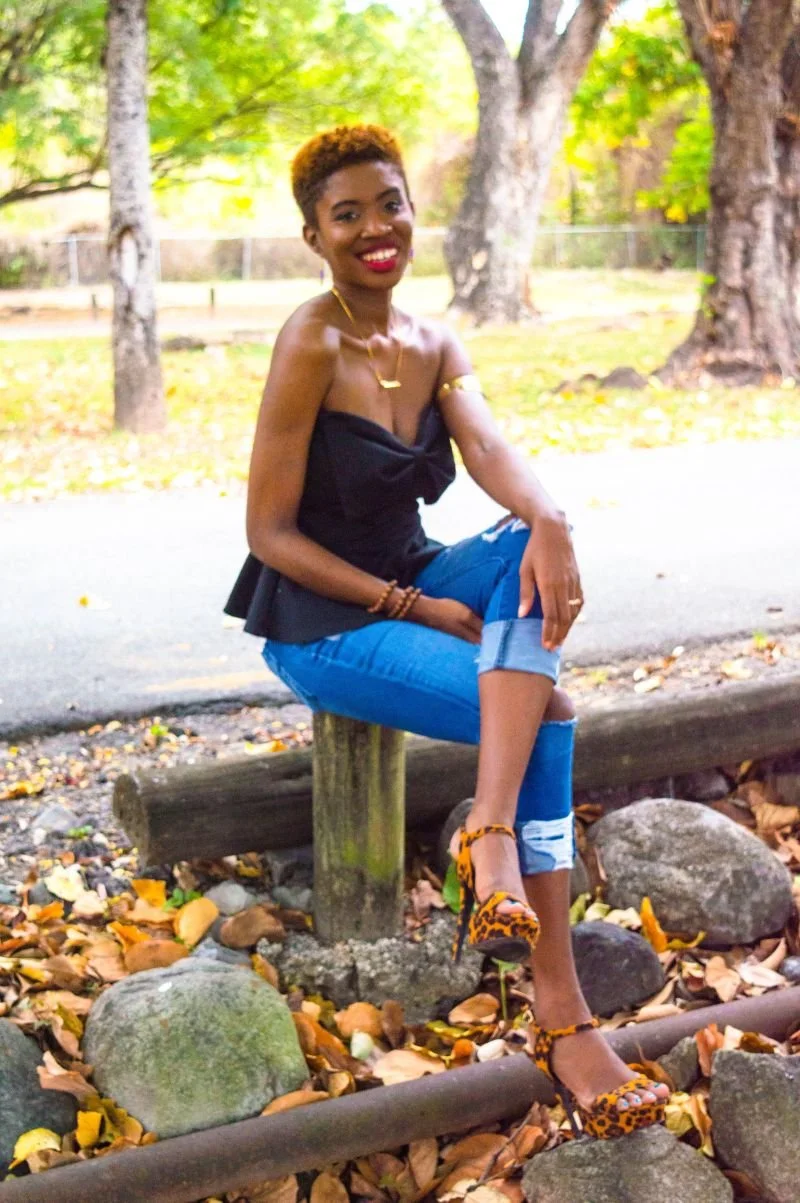Literacy & Collaboration with Alyssa
EXPERT INTERVIEW
Alyssa is passionate about supporting readers in ways that are thoughtful and help people feel empowered in the process. I met Alyssa when she reached out for a chat and have been following her on social media for a while now. I love seeing her simple tips and thoughtful advocacy for the students and teachers she supports.
If you’re working with readers yourself or want to see how getting to the root of an issue can come in handy in the reading/learning process (as it would for yours too!) then let’s jump into the article!
Tell us about what you do through your business:
I help connect literacy research to practice in an emotionally sound and supportive environment. I support both students and the educators who serve them. I leverage academic and instructional coaching support as a means to improve literacy outcomes.
What's happening in your business that you're excited about?
I have just been asked to collaborate with my local County Office of Education on a Summer Literacy Institute offered to teachers across multiple school districts in the area. I love that this feels really high impact for the students in my community - by being able to connect so many educators to the research so I can provide a bridge from the Science of Reading to instructional activities to teach students in the classroom...the what, why, and the how!
Trained, knowledgeable teachers is our greatest defense against reading challenges and illiteracy. I love contracting with schools and collaborating with admin and teachers for this exact reason. Our instructional methods, programs, or curriculums don't have automatic effects like simply swallowing a pill. We, as teachers, make these methods work starting from the very beginning with our mindset, shared vision, how we collaborate and feel supported. As teachers we do not just install practices but instill them, through our beliefs, our efforts and shared desires to see them work.
what do you find delightful about what you do?
I love the continued learning and research that is involved with my job. Researching more about the Science of Reading and how the reading brain works fascinates me. Taking classes about current best practices in teaching and intervention strategies satisfies the life-long learner in me. Constantly reflecting on my own pedagogy keeps me growing. I will never be done learning and growing, and the work will never grow stale!
What brings you joy personally?
As a social entrepreneur I do love being a part of a community and involved in something bigger, whether that is online with others throughout the globe, or right here in my own neighborhood. Aaand I equally love the quiet, small, peaceful moments throughout my day. I love and honor the joys of hiking in the sunshine and feeling the breeze on my face, reading a story to my son while snuggled together before bed, or enjoying a cup of tea with my cat purring on my lap. Taking the space to find time for these little joys is a must for me. They fill me up so I can continue to pour out for others.
What is your favorite way to celebrate accomplishments?
Aside from doing a happy dance, I love to share accomplishments with others. I started a virtual hub with my former business coach called The Tutoring Table. Here fellow "edu-prenuers" can come together to collaborate and network and seek mentorship. It has been such a supportive community in which we are constantly cheering each other on. It is a "come as you are" meet up and we welcome new faces throughout the globe. We meet every Friday via Zoom and it is a wonderful opportunity for those craving community to come together in this often times isolating profession. We share our challenges in starting, growing, or sustaining our businesses and of course, our WINS!
How do you make/find ease when you need it?
For me it is reminding myself that done is better than perfect. Taking (sometimes scary) messy action leads to progress, and it makes the work feel more authentic. I can only make impact and support others if I put my work, and myself, out there. It takes the burden of perfectionism and comparisonitis off my shoulders (something I've struggled with as a business owner!).
Who has inspired you most about working with readers?
It is tough to pick just one person - I'd have to say all of the other hardworking teachers out there are always my inspiration for doing this work. The inspiration is rooted in my own childhood experiences with teachers who were patient and steadfast, who created caring classroom communities in which struggling students like myself could thrive. They created the desire to pursue teaching myself so that I could bring more of that to others. I continue to be inspired by teachers and parents everywhere whom I support, who are up against many odds, and are constantly striving to learn and grow so they can be the best for their students.
What is one thing you've discovered about yourself through owning a business?
This is hard to know where to start, let alone pick just one! I started this business 3 years ago and it has been a JOURNEY! And a journey of self discovery has definitely paralleled. It's been filled with themes like finding your own voice, acknowledging/establishing/demanding your worth, doing things scared, learning how to say no (and yes!), learning how to block time for self-care, when to ask for help, how you define success, and so much more. One thing that I have discovered about myself during this entrepreneurship endeavor is that I really enjoy networking and am good at it. Although I have had some experience with this process as a literacy program director and liaison for a large social venture, I've never done it on the solo. I've discovered that I truly love connecting people to others that can offer support, I love growing my network and collaborating with and learning from new people, and I love the opportunities that have arose from my networking efforts. Fostering these relationships brings me so much joy and enthusiasm.
Where do most people get stuck when it comes to supporting people with reading challenges?
They have a hard time understanding WHY people are struggling to read. There is this misconception that reading is a natural process and that everyone learns to read differently. This misconception is dangerous because it leaves us to believe that if we "wait and see" children might catch-up or something might magically click, or that simply having our children read more books will make them better readers. And this leads to many schools currently only intervening after reading failure is substantial and chronic, usually in the second grade or later, leading to low self-esteem and many gaps in learning.
The reality is reading is a skill that needs to be EXPLICITLY and SYSTEMATICALLY taught - from hearing the sound parts in words needed for decoding (phonemic awareness) and understanding how sounds and letters are connected in words and in sentences, while simultaneously building background knowledge and a robust vocabulary to support reading comprehension. Learning to read is a complex process that actually rewires and changes our brain anatomically. Targeted interventions are most effective when administered early, ideally in kindergarten and first grade. It is harmful to our children when we get stuck in the "wait and see" cycle. Early, explicit instruction of the most foundational skills and early intervention when children are struggling is key in improving literacy outcomes. That being said, although it will be harder as you get older, it is never too late to learn how to read. Neuroplasticity, or brain plasticity, is a beautiful thing! It is possible to rewire our brain for reading through structured, explicit, systematic instruction at any age.
What are your favorite tools for helping people learn to read?
There are many. I use my phonogram deck, my sound wall, and decodable readers/texts daily when I tutor. But the tool I use the most and can't live without is magnetic whiteboards and dry erase markers. A lot of reading knowledge is gained through encoding work (a.k.a. writing/spelling). Whiteboards support the "I do, We do, You do" model for learning to read. They are extremely user friendly and provide opportunities for smoother, immediate error correction which is crucial for struggling readers. Using whiteboards is a part of hands on, multi-sensory instruction where students are simultaneously seeing, saying, hearing, touching as they are learning.
How do you determine where someone is in the process of learning to read when you first meet them? Do you have a welcome process?
It is interesting that for my service, my "user" and "buyer" are two different people. My buyer is typically either the parent or school administration team, and my user is either the student or teachers. My welcome process involves getting to know the pain points of the buyer first, offering a discovery call and free strategic planning meeting. It is hard to see students struggling, especially when they are your own children, so this is usually a process filled with a lot of associated emotions. My main goal is to be a listening ear and offer resources and advice to get these children the support they need to succeed.
Then, first and foremost, I always recommend a tutoring client start with my reading assessment process for their student(s). My reading assessment service has three parts. 1) Administering a reading assessment with the student, either online or in-person. This usually takes around an hour and we keep it very low pressure and game-like. 2) I then analyze the results and, combined with my observations, create a detailed written report. 3) I then follow up with a debrief meeting where we can go over the results and discuss recommended next steps. Reading strength and areas of need can be looked at on a continuum and reading skills follow a fairly clear progression. Pinpointing the gaps and uncovering where and why people are struggling in their reading journey can be done through diagnostic assessments administered by a qualified specialist such as myself. These assessments are the roadmap from which we can start targeted, individualized support.
I pride myself in providing a very emotionally sound process and highly supportive environment to both my buyer and user. When working with a new learner, it is important to make them feel comfortable, connected, and safe to try new things. Building rapport is first and foremost - relationships before rigor is my motto.
What do you want most people to know about literacy in the United States?
Literacy is EVERYTHING. Millions of Americans struggle to read and it affects children across the country, regardless of their zip code. Our Nation's Report Card paints a dismal picture: 66% of fourth graders in our country are reading below grade level. Yet, it is said that illiteracy is one of the most solvable issues of our time. Solutions to the reading crisis are here, we just need to inform ourselves and then take action. It is a crisis that effects us all, it is time for everyone to join the reading revolution! To start, I recommend that we all listen to the podcast Sold A Story, a journalism project from American Public Media, and watch The Right to Read Film if you can access it.
Alyssa Althouse
If you want to chat more with Alyssa about this article you can connect with her on Instagram:
www.instagram.com/learn_with_alyssa
To collaborate or work with Alyssa visit:
Want to be interviewed?
Want to read more?











